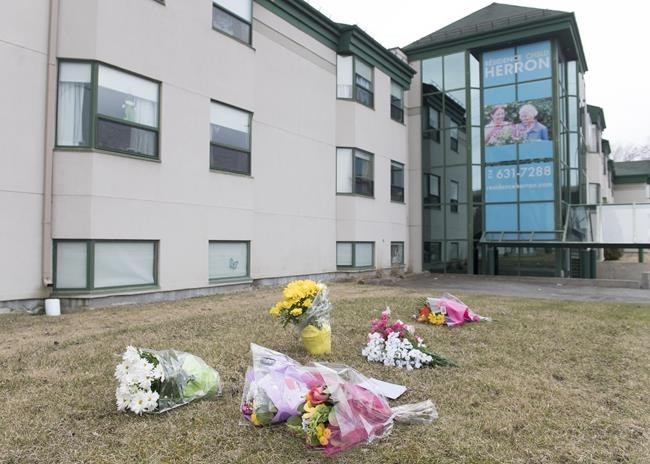MONTREAL — A judge has approved a class-action lawsuit that accuses Quebec's health network of failing to protect long-term care centres during the first year of the COVID-19 pandemic and causing avoidable suffering and death to thousands of residents.
The province's response to the first two waves of COVID-19 was improvised, and health network officials ignored a pre-existing pandemic plan until it was too late, claims the lawsuit authorized by Superior Court Justice Donald Bisson.
Patrick Martin-Ménard, the lawyer representing members of the class action, said the Quebec government had "all the tools available" to protect the most vulnerable but failed to do so.
"We didn't know about COVID at that time, but we had enough information to know what kind of threat we were exposed to with a pandemic, and there even was a plan in place to face it," Martin-Ménard told a news conference Tuesday.
Members of the class action include anyone living in 118 public long-term care centres that the lawsuit says experienced a COVID-19 outbreak that infected at least 25 per cent of residents between March 13, 2020, and March 20, 2021. Class action members also include surviving spouses, children and grandchildren of residents.
Martin-Ménard says he estimates the suit will include between 6,000 and 7,000 long-term care residents as well as an unknown number of family members.
One resident who died was the mother of representative plaintiff Jean-Pierre Daubois. Anna José Maquet, 94, died in April 2020 at the Sainte-Dorothée long-term care centre in Laval, Que. She choked while drinking water and was placed on a respiratory distress protocol that Daubois says he believes led to her death. The outbreak at the facility killed more than 100 residents.
Daubois told reporters Tuesday he wants to ensure that the "improvisation" of Quebec's pandemic response isn't repeated. "I'm still mad because it was avoidable," he said.
The nurse who normally cared for his mother was hospitalized in an intensive care unit with COVID-19 at the time Maquet died. He said COVID-19 was introduced into his mother's long-term care centre after two employees — who allegedly reported that they had been infected — were told by management they would be disciplined if they didn't come to work.
"It's a big victory for the families, this first step, because we want them to be accountable for what they did and did not do," Daubois said about the class action's authorization.
Martin-Ménard said Quebec's long-term care network was neglected in the early days of the pandemic as the government focused on protecting hospitals. Care staff weren't trained in infection prevention and control, he added, and no steps were taken to address labour shortages, which prevented residents from receiving "even the most basic care."
"This tragedy," Martin-Ménard said, "was the result of a series of negligent practices and poor decision-making by public health authorities and by those who were responsible for planning and preparing the health-care system for the pandemic, because there was a plan."
The lawsuit names as defendants the Sainte-Dorothée long-term care centre, 20 regional health authorities and the province's attorney general — as the representative of the health minister and public health director.
The Health Department declined to comment on the case Tuesday.
Martin-Ménard's class action alleges that many of the factors that led to outbreaks during the first wave of the pandemic continued into the second wave: transfer of staff between facilities with infected patients; inadequate personal protective equipment; and limited access to basic care for patients because of labour shortages and the large percentage of staff who were off sick.
The Quebec government has argued that the class action was too broad and that while the lawsuit's allegations may have applied to the Sainte-Dorothée long-term care centre, they didn't apply across the entire network or to the second wave of the pandemic.
The suit aims to obtain compensation of $100,000 for each resident who was infected, with additional compensation for those who were hospitalized, or should have been hospitalized but were not because of government policies. It also seeks $40,000 for each resident who didn't get sick.
As well, the lawsuit is seeking additional compensation of at least $100,000 for the surviving spouse of a resident who died, and $30,000 for each of their children. The suit is also asking for an extra $10 million in punitive damages on behalf of residents.
This report by The Canadian Press was first published Jan. 23, 2024.
Jacob Serebrin, The Canadian Press
Note to readers: This is a corrected story. A previous version misspelled the name of Patrick Martin-Ménard.



